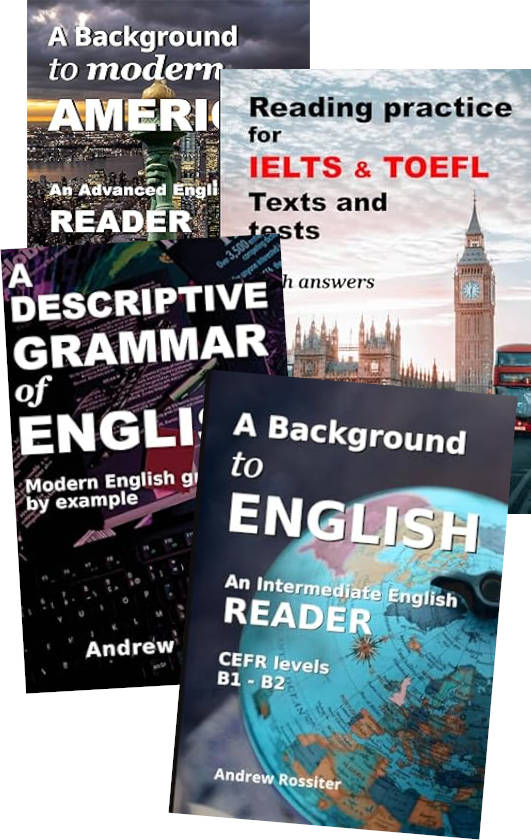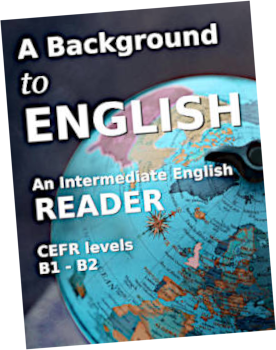| Other free Linguapress resources: | ► Advanced level reading resources | ► Intermediate level reading resources | ► Thematic crossword puzzles & word games |
Flesch-Kincaid, other readability scales and their relevance for the EFL / ESL class
Judging the difficulty of reading texts for learners of English
| Index : | The Flesch-Kincaid scales | Relevance for the EFL environment |
A comparison of different readability scales
The Flesch-Kincaid readability analysis and the CEFR - IELTS grading systems measure different parameters, so they will not necessarily produce the same result when assessing the difficulty of a text. Essentially Flesch-Kincaid analyses documents for their readability by people living in an English-speaking environment, whereas the CEFR and IELTS scales analyse documents for their accessibility to learners of a foreign or second language.In many cases the different systems will produce the same result - but not always. Flesch-Kincaid, for example, underestimates the difficulty for non-native speakers of documents containing lots of short sentences, such as dialogues.
Furthermore, applied to the free online ESL / EFL resources on Linguapress.com, neither Flesch-Kincaid scores nor CEFR scores can take account of the fact that difficult vocabulary is explained in word guides; nor do they take into account the fact that for speakers of other Romance languages (Spanish, Portuguese, French, Italian), many of the "complicated" words in English (those with Latin roots) are not complicated at all as they are very similar in these languages. For example, a CEFR text analysis will show the words humble and symbolic as being C2 level words, even though they are very similar in Romance languages and, in the case of the word symbolic, in many other languages too.
The reality of the situation is that the difficulty of any text in English will vary in function of the reader's native language, and not just in function of the words and grammatical structures used. While the word humble is of no difficulty at all for a French speaker, the word being identical in French and English, it may well be a new and incomprehensible word for a speaker of Korean or Hausa.
The Linguapress overall assessments are a synthesis between these and other grading systems.
► See also: What is the CEFR B2 level - and what does it involve?
| Linguapress
overall assessment |
Flesch-Kincaid readability scores and levels | CEFR and Cambridge levels- IELTS |
 |
0-50 Very difficult (Higher education level) | C2 Mastery / Proficiency 8 - 9 |
 |
50 - 60 Fairly difficult (11th or 12th grade - final years of high school) | C1 Advanced 7 - 8 |
 |
60 - 70 Plain English - should be easy to understand by students from 14 to 15 years upwards | B2 Upper intermediate - 6 - 7 |
 |
70 - 80 Fairly easy - accessible to students aged 13 upwards | B1 intermediate - 4.5 - 6 |
 |
80 - 90 Easy | A2 elementary - 3 - 4 |
 |
90 - 100 Very easy : | A1 EFL beginners - 1 - 2 |
The Flesch-Kincaid readability scales
The Flesch-Kincaid scales were originally devised in the 1970s by the United States Navy in order to ensure that all documents were written in a level and style of language that would be understandable by people who would have to read them. They were later developed as a tool for grading the difficulty of written texts used in education.The scores awarded for any written document are obviously not always perfectly accurate, given that they are the result of a computerized textual analysis that cannot take all incidental criteria into account; but they give a fairly good overall assessment of how easy or difficult a written document will be to understand.
In brief, they are a technical analysis of the use of short words and longer words, and the number of words per sentence. Basically speaking the shorter the words, the easier the level of English, and the shorter the sentences, the easier they are to understand.
This analysis works particularly well for texts in English, since English is an "analytic" language with very few word endings; in addition, the bulk of everyday English vocabulary consists of words of Germanic origin, whereas most of the more complex words, literary words or scientific terms, are of Latin or Romance origin (See the history of English), and also longer.
The Flesch-Kincaid analysis of a text produces two scores:
- A Grade level score corresponding to standard US school grades, in which 12 is the final year of high school
- A
Readability score on a scale of 0 - 100 in which,
confusingly, 0 is
"very
difficult" and 100 is "very simple".
On the readability scale, scores between 80 and 70 are considered "plain English"; scores between 70 and 60 are "fairly easy to read".
Flesch-Kincaid and the EFL class
Flesch-Kincaid scales are designed to measure readability by students who are native English speakers.Consequently the Grade level result for a given text normally needs to be adapted for judging which grade or which class a text is suitable for using with in an EFL or ESL environment.
A text that is analysed as being suitable for study in Grade 6 (last year of primary education, ages 11 - 12 ) in a native-English school environment can be considered suitable for students with between 2 and 5 years of EFL or ESL in a high-school environment (grades 7 - 10), depending on the language skills of the students.
Technical texts will get a higher grade rating on account of the specialist vocabulary used, so a text graded 8 for an English-speaking school environment may be suitable for grades 8-10 in an EFL environment.
Dialogues: Flesch-Kincaid analyses do not work well on dialogues, on account of the many short sentences and short words. Flesch-Kincaid considers them to be easier than they actually are.
Any text can be checked online using the tool available here. This readability tool will grade a text for Flesch-Kincaid values and according to a number of other readability indices.
© linguapress.com
Propose a short article or useful resource
Publish a useful article on EFL teaching or classroom techniques on Linguapress.com , or – if already published – ask Linguapress to link to your online resource. Contact Linguapress using our resource submission formWebsite
and texts © Linguapress.com renewed 2024 except
where
otherwise
indicated
Contact: Use the form on our get in touch page
Contact: Use the form on our get in touch page



